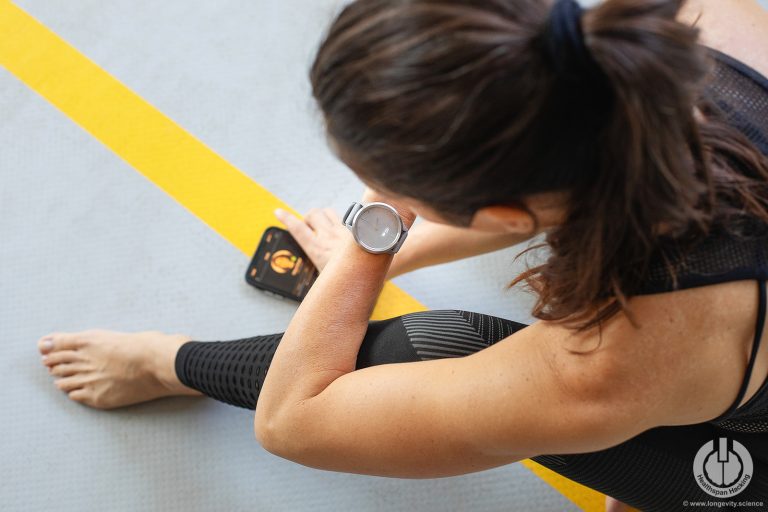Your Heart Rate Variability could well be one of the most important measures of your health. Discover how to track it and what you need to do to improve it!
Most of us have been using our heart rate as a measure of our aerobic fitness level since we were kids. After a run at school we were taught to feel the pulse on our wrist. While this is, indeed, an important measure of our heart’s performance, it is not the only one, nor the most important.
It turns out that monitoring the beat to beat variation and the time intervals between heart contractions provides a far more valuable window into what is going inside our body, possibly as important as our expected lifespan This biofeedback healthspan hacking measure is known as heart rate variability. (1)
In this article, we take a deep dive into heart rate variability. We’ll discover why it is such an important biofeedback marker, how it can be used to optimize physical and cognitive performance and what healthspan hacking techniques you can start using today to improve your heart rate variability.
The Ever Changing Heart Rate – And Why It Matters
Contrary to what many people believe, the heart rate does not follow a constant pattern like a metronome. The time between beats is constantly changing. It turns out those changes reveal an incredibly valuable message about our health. This fluctuation is controlled by the autonomic nervous system, which is made up of the parasympathetic and the sympathetic system. (2)
The sympathetic nervous system is also known as the fight or flight system. Its activation causes an immediate increase in the heart and respiratory rate as the body prepares to meet a stressful situation. This requires a lot of energy.
The body then returns to a state of homeostasis by switching to parasympathetic dominance. This system promotes rest, digestion and wellbeing. Whether or not we are in sympathetic or parasympathetic dominance is controlled by the vagus nerve in the brain.
The imbalance between sympathetic and parasympathetic activity has been recognized as a key indicator of both psychological and physical illness. The measure of heart rate variability has been shown to be the best window available into these opposing systems. Heart rate variability is a normal and desired outcome. However, the more stressed we are, the shorter the interval between heart beats. Conversely, the more relaxed and calm we are, the greater the intervals between beats and the higher the HRV.
So, we can consider HRV to be a measure of the interplay between our sympathetic and parasympathetic nervous systems. The higher the HRV reading, the more balanced that relationship is. From a healthspan hacking point of view, our goal is to increase our HRV in order to enhance the state of homeostasis that enhances our overall health.
While it is certainly possible to improve your HRV measure, it should be noted that there are a number of factors that determine your heart beat intervals. Genetics plays a role, as does age and gender. So, rather than trying to achieve an arbitrary ideal HRV number, it is more advantageous to set the goal of improving your HRV in relation to your rolling baseline. This is the best practice for both physical and mental wellbeing.
2 Hacks to Improve Your HRV
When you improve your HRV, your daily readiness to tackle life will be enhanced, your resting heart rate will go down and your body will better adapt to external stimulus. Here are two hacks you start incorporating today to enhance your HRV:
Cold Exposure
Cold exposure is a hermetic stressor that results in acute sympathetic arousal. This then brings on a parasympathetic state during recovery from the cold exposure. Immediately following the cold exposure you will experience a significant lowering of HRV. However, in order to get back to a state of homeostasis, this will be followed by a higher rate of HRV as you enter the parasympathetic state. (3)
Hot and cold contrast showers and cold plunges are effective methods of cold exposure.
Better Quality and Quantity of Sleep
The better quality and quantity of sleep you get, the higher your HRV will be. That’s because the majority of your body’s repair, recuperation and recovery occurs while you are sleeping. It is also while you are asleep that your heart rate is at its lowest. A key aspect of healthspan hacking is providing the body with the optimal environment for these processes to occur(4) (5)
One key to achieving a good night’s sleep is maintaining an ideal bedroom temperature. That ideal temperature has been shown to be 65°F (18.3°C). This temperature best correlates with your body’s internal temperature throughout the night.
Another consideration to enhance your sleep environment is to keep your bedroom as stimulus free as possible. This will help your mind and body to relax as it winds down for the evening. Keep all technology (including your phone) out of the bedroom. Try to make the room as dark and noise free as possible.
3 More Ways to Improve your HRV
- Stay hydrated
- Eat a balanced diet
- Minimize stimulant consumption
Summary
Heart Rate Variability is an essential marker of your body’s cognitive and mental health, as it provides a window into the interplay between your body’s competing stress and restore nervous systems. In order to improve your HRV markers, use cold therapy and take active steps to improve your quality and quantity of sleep. Doing so will improve your health longevity, helping you to advance to a vibrant, energetic future.
References
- https://pubmed.ncbi.nlm.nih.gov/17111118/
- https://pubmed.ncbi.nlm.nih.gov/8458993/
- https://pubmed.Functional anatomy of the autonomic nervous systemncbi.nlm.nih.gov/18785356/
- https://www.ncbi.nlm.nih.gov/pmc/articles/PMC3427038/
- https://www.sciencedirect.com/science/article/pii/S0301051115000447



